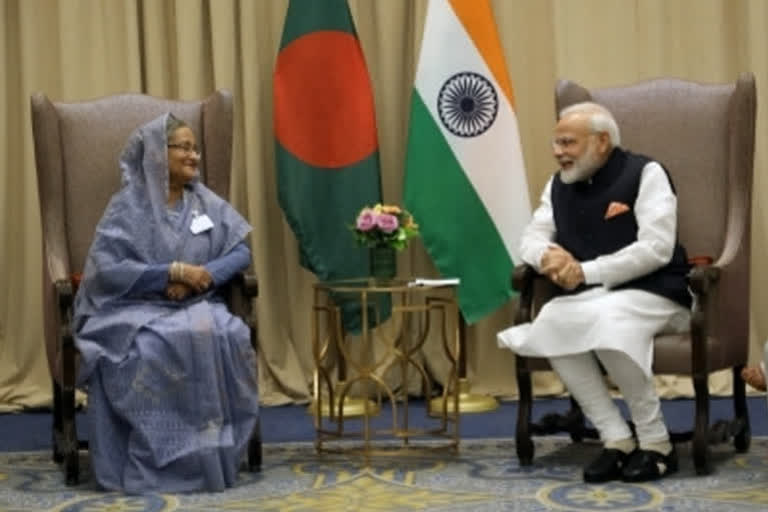Hyderabad (Telangana): In his message of gratitude towards India on the occasion of the Bangladesh founding day, Sheikh Mujibur Rahman had said ‘the Indian soldiers sacrificed their lives for us. My people will always remember their sacrifice.’ The two-day Bangladesh visit by Prime Minister Modi to confer the Mahatma Gandhi Peace Prize on the father of Bangladesh is historic.
Apart from its borders, Bangladesh also shares a historic, social, cultural and spiritual bond with India. The Liberation of Bangladesh proved the fact that a nation is bound more by language than religion. The Bangladesh creation is the inspiration behind International Mother Tongue Day. Though ridiculed by the likes of Henry Kissinger as a basket case at the time of its formation, Bangladesh crossed Pakistan in all the development indices. Therefore it is truly a golden jubilee for Bangladesh.
The Indo-Bangla pact signed by Indira Gandhi and Mujibur Rehman in 1975 subsequently underwent severe ups and downs. Issues related to refugees and river water sharing, border disputes and disruptive activities on the borders, camps of anti-India forces inside Bangladesh, the propaganda blaming of India for all the problems faced by Bangladesh and all such issues created distance between India and Bangladesh. As democracy took roots after the end of military rule in Bangladesh, misunderstandings between the two neighbours slowly evaporated. The land dispute was permanently settled in 2015. If the ten-year-old Teesta river water sharing treaty is also put on the track, a new history of progress will be written in the sub-continent.
READ: PM Modi holds talks with Sheikh Hasina; India, Bangladesh sign 5 MoUs
Since the 1980s, Bangladesh growth rate has begun gaining momentum. It began competing with India in terms of per capita income too. The industrial successes achieved by Bangladesh are truly astonishing. The share of agriculture in the Bangladesh GDP was 33.2 per cent about four decades ago. The agricultural contribution shrank to 14.2 per cent and the contribution of industry to its GDP rose from 17 per cent to 36.6 per cent. About a month ago, the UN Committee on development policy has sought to remove Bangladesh from the list of lowest developed countries and recommended its inclusion in the list of developing countries. If the recommendation is approved, Bangladesh would be able to conduct trade with advanced countries without bothering about duties and export quotas.
Bangladesh has been permitted to do 97 per cent export of its products to China without any duties. China has also stated that Bangladesh would be able to earn 140 US dollars due to this preferential treatment.
China has been keeping all the countries surrounding India under its control, under the Belt and Road Initiative. Beijing did not spare Bangladesh too in this process. Prime Minister Modi has made several improvements to the Look East policy and taken up the Act East policy. He has launched several schemes that will give a new direction to the relationships with Bangladesh. India accorded top priority to Bangladesh in its vaccine exports. India did not overlook the fact that by strengthening relationships with Dhaka, it would be also making stronger its relationship with Myanmar, Thailand, Cambodia, Laos and Vietnam. Strengthening its relationship with Bangladesh, which is counted among the briskly developing economic systems of the World, will be also beneficial for India.
READ: India-Bangladesh ties becoming a model for South Asia: Ex ambassador



